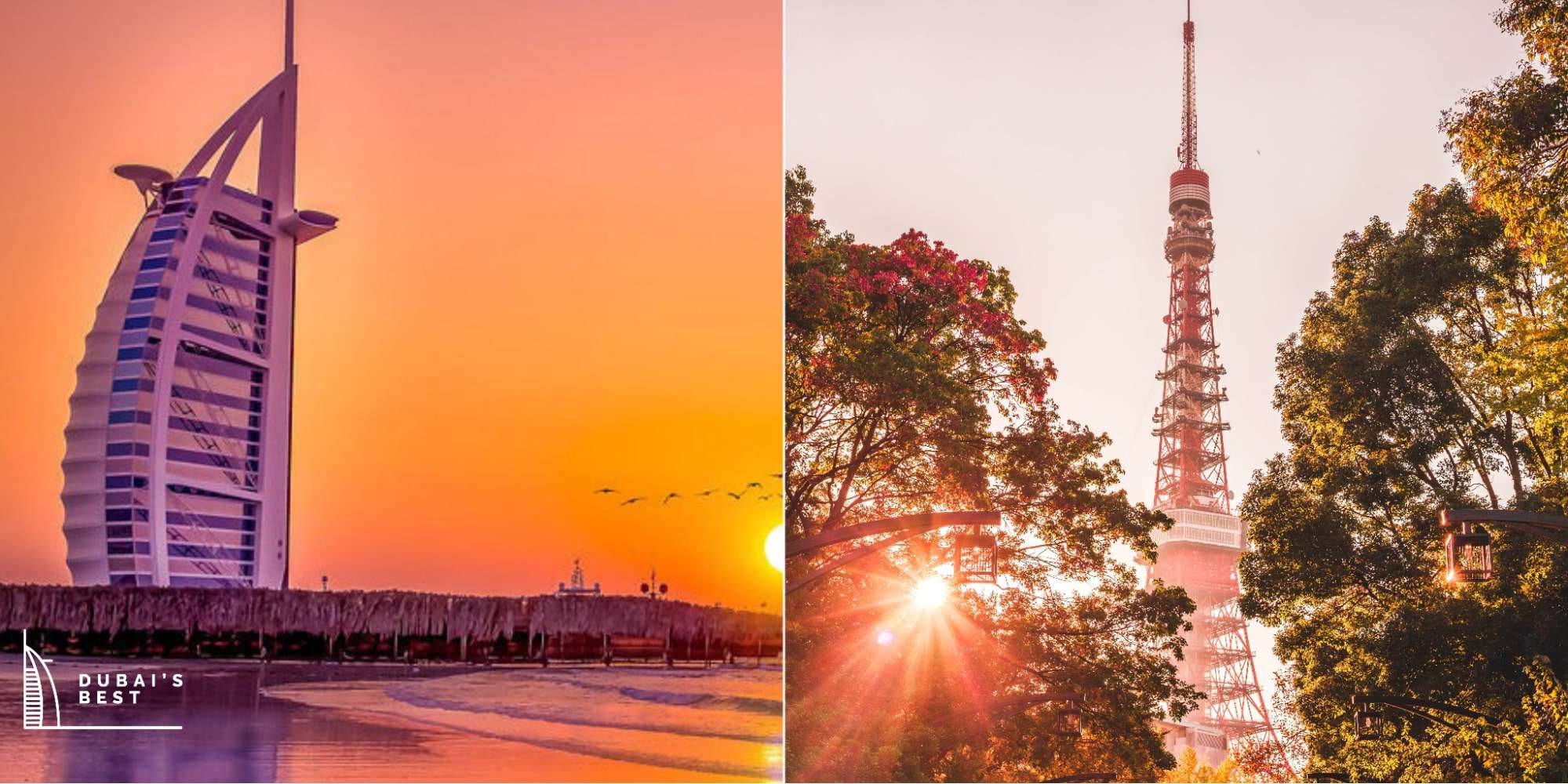Dubai Vs. Tokyo: Which City Is Better?
Dubai and Tokyo are two highly coveted cities for foreigners to live in – and for good reason.
Both cities are modern, safe and innovative, and they’re also designed to offer the best quality of living to their residents.
If you prefer a place where you can create a balance between work and play, Dubai is the city for you. Meanwhile, if you prefer a walkable city that’s close to nature while still having good opportunities, Tokyo is a good choice.
To explain our conclusion better, we’ll show you a detailed comparison of both cities in terms of attractions, culture, cost of living, diversity and demographics, career opportunities and more important points to help you decide.
Top Attractions in Dubai vs. Tokyo

Dubai hits the mark when it comes to tourist attractions. The city has a long list of landmarks, skyscrapers, theme parks and resorts for you to enjoy.
Tokyo, on the other hand, has more parks and temples, although it also has the Tokyo Tower and other important landmarks that you can visit.
With the goal of steering its economy towards tourism, the Dubai government has invested in building tourist attractions that you won’t find anywhere else in the world.
So, whether you’re a tourist or local, you won’t run out of fun things to do and explore in the city. In fact, there’s something for every age, preference and budget in Dubai.
Here are some of the top tourist attractions in the city:
Tokyo, on the other hand, has lesser tourist attractions and are focused more on experiences with nature, although the city also has some important landmarks:
Culture in Dubai vs. Tokyo

Both Dubai and Tokyo may have become modern mega cities, but they’ve done a great job in preserving their cultures and traditions.
But in terms of language, Dubai is easier to adapt to since it has a largely expat population and most of its locals are well versed in English.
In Tokyo, however, a lot of locals can only speak a little English, so you might need a translator in some instances.
There are 3.49 million expats in Dubai, which is more than half of its population. So, the city has also become a largely English-speaking community with most locals being fluent in the language.
On the other hand, Tokyo only has 581,112 foreign residents, so its local population still dominates the city.
This is why you’ll see that most locals can only speak Japanese and may need to use a translator when communicating with foreigners.
In terms of culture, both cities have kept most of its practices and traditions including:
Cost of Living in Dubai vs. Tokyo

Dubai’s cost of living is 23% higher than in Tokyo considering that you’re renting in both cities.
You would need at least AED 20,505 monthly to maintain the same lifestyle that you can enjoy in Tokyo for only AED 14,898.
To give you a better idea of how we came up with these numbers, let’s compare some of the most common expenses and how they fare in both cities using data from Numbeo.
From the table above, most of these common expenses are higher in Dubai than Tokyo, especially when it comes to monthly rental, utilities, transportation and childcare.
Real Estate Prices in Dubai vs. Tokyo

If you’re planning to buy a home, Tokyo is generally more expensive than Dubai, whether you’re in the city center or outside the city center.
Dubai also has a more extensive housing selection in different areas of the city as compared to Tokyo.
The real estate market in Dubai is one of the best in the world not only because of good pricing but also because of your options.
Here, we compare the price of buying an apartment in Dubai and Tokyo with data from Numbeo:
Diversity and Demographics in Dubai vs. Tokyo

Dubai is one of the most diverse populations in the UAE with more than 200 nationalities living in the city.
Tokyo, on the other hand, is still highly mono-racial with a 98% Japanese population.
Dubai has always been a multicultural community, which is why it’s very easy for any foreigner to feel right at home in the city.
In fact, 85% of Dubai’s population are composed of expats while Tokyo only has a 2% expat population.
Here are the top nationalities in both cities:
From a demographic standpoint, Dubai has a larger land area than Tokyo, but the latter is a lot more densely populated.
In terms of gender split, you’ll see that Dubai has a largely male population while Tokyo has a largely female population.
Life expectancy at birth is also higher for people in Tokyo as compared to Dubai.
Career Opportunities in Dubai vs. Tokyo

A report from CNBC puts Dubai as the second best city in the world to live and work abroad stating that 70% of people are happy with their job and 61% are satisfied with their work-life balance.
Dubai also offers a more competitive average monthly salary of AED 16,267 as compared to only AED 9,869 in Tokyo.
If you’re looking for a job, Dubai has a more diverse career market as compared to Tokyo.
In this table, you’ll see the highest paying jobs for foreigners in both cities and their average salaries:
Crime and Safety in Dubai vs. Tokyo

Dubai is a safer city to live in as compared to Tokyo, according to data from Numbeo where Dubai had a Safety Scale of 83.67 while Tokyo had 76.07.
Dubai also has a lower Crime Index of 16.33 while Tokyo had 23.93.
To give you a better picture of how safe Dubai is compared to Tokyo, we look at some ofthe most common crimes and their rates in both cities:
Lifestyle in Dubai vs. Tokyo

Dubai is the right city to live in if you want to live in a diverse location that gives you access to modern amenities and conveniences for both work and leisure.
But if you prefer to be in a more budget-friendly city with cooler weather and many natural landscapes, Tokyo would be the ideal place to live in.
To give you a better perspective of the type of lifestyle that these cities can offer, we compare them based on factors like weather, healthcare and education.
Weather in Dubai vs. Tokyo
Dubai has hotter weather for most of the year while Tokyo enjoys both sunny and snowy days.
On an average summer day in Dubai, temperatures can reach up to 50 degrees Celsius while it only drops to 14 degrees Celsius during winter.
Although Dubai has both summer and winter seasons, the city is hot for most of the year since it’s located in the Arabian desert.
You also won’t experience any snow in the city and rain is only very rare during winter.
Tokyo, on the other hand, has four seasons – winter, spring, summer and fall.
On a good summer day, temperatures in Tokyo can reach up to 31 degrees Celsius while it can drop to 2 degrees on a chilly winter day.
Healthcare in Dubai vs. Tokyo
Both Dubai and Tokyo offer world-class healthcare systems, thanks to the efforts of their governments. But healthcare is considered more expensive in Tokyo than Dubai.
Health insurance in Dubai costs on average of AED 6,000 per year for a single individual while it would cost you AED 10,548 in Tokyo to get the same coverage.
All residents in Dubai are also required to get medical cover. All Emiratis get it for free while foreigners need private medical cover, which will be provided by their employer.
If you’re moving to Dubai with your family, you’ll need to get medical cover for them.
There are many good health insurance providers in the city that offer these minimum standards:
- Emergency cover in all emirates
- A minimum annual limit of AED 150,000
- Coverage for pre-existing conditions after an initial 6-month waiting period
- Outpatient treatment coverage (20% maximum excess)
- Inpatient treatment coverage (20% maximum excess and AED 1,000 annual cap)
- Maternity coverage of at least AED 7,000 (10% maximum excess and AED 10,000 maximum cap for C-section)
- All essential vaccinations
- Semi-private hospital accommodation
Tokyo follows Japan’s public healthcare system known as the Social Health Insurance (SHI).
Anyone who is fully employed with a medium or large company in Tokyo should be insured under the SHI with a 5% salary deduction that will be matched by the employer.
However, you need to wait for one year to enroll with the SHI, in which time you might need to secure your private international health insurance plan.
But once you already have SHI, you can take advantage of services such as screenings, checkups, hospitalization, infectious disease control and prenatal care.
No matter what type of service you use, you’ll need to pay for 30% of the costs while the government will shoulder the remaining 70%.
Education in Dubai vs. Tokyo
Dubai has a more diverse educational system than Tokyo with a lot of schools offering international curriculum to locals and expats.
Here, we compare the average cost of education in both cities:
Dubai vs. Tokyo: How They Stack Up
After considering different factors, Dubai has the leg up when it comes to overall quality of living if you’re a foreigner who wants to move overseas.
The only advantage Tokyo has is that its cost of living is cheaper, although Dubai balances this out by offering no taxes on income and higher salary rates.
To give you a recap, here’s a summary of our comparison of both Dubai and Tokyo to help you decide which city is the right place to live in:

